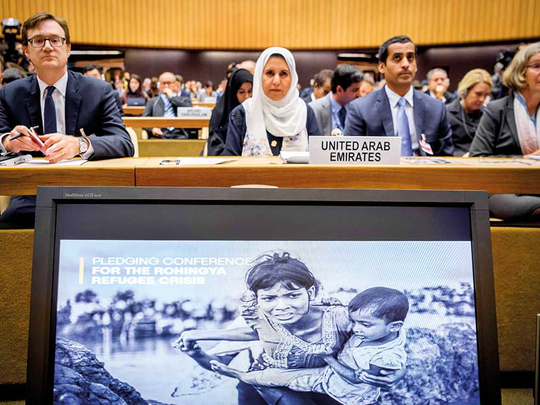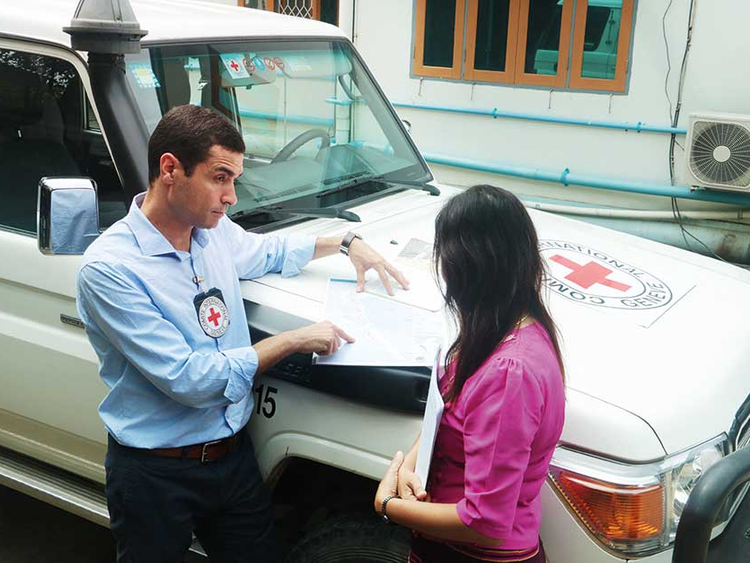
Dubai: Humanitarian relief organisations are racing against time trying to meet the dire needs of the increasing number of Rohingya refugees escaping what is being described as the worst humanitarian crisis in modern times.
As nearly 600,000 people have fled “ethnic cleansing” by Myanmar military and crossed the border to neighbouring areas, humanitarian organisations are desperately trying to aid the displaced, including those still inside Myanmar.
Aid organisations are working in a “rapidly and daily changing situation”, said Enrique Ochoa, International Committee of the Red Cross (ICRC) Head of Operations in Rakhine State, Myanmar.
“Different people have different needs depending on their situation; some have remained in their homes, others are temporarily displaced, and others are still on the move,” he told Gulf News.
“Beyond the immense size of the crisis, challenges include security risks, the remote locations of people in need, poor roads and other infrastructure, monsoon rains and a looming cyclone season,” said Ochoa. He arrived in Rakhine last October to head the emergency response to the crisis, which is a joint operation of the ICRC and the Myanmar Red Cross Society (MRCS).
Ochoa explained that ICRC is addressing the challenging conditions through “rapidly expanding our logistical and operational capacity: a helicopter has been commissioned to support assessments and delivery of aid in more remote locations; over 400 tonnes of emergency assistance is being shipped to Rakhine; fleets of cars, trucks and boats [being deployed] are being increased; and human resources are being added to implement the immediate plan of action”.
Rakhine state, especially the northern part of it, was where all the violence started.
On August 25, insurgents from Rohingya, which is a Muslim-minority group, attacked some 30 police posts in northern Rakhine with knives and homemade bombs.
Myanmar’s military, backed by Buddhist mobs, responded, saying they are targeting insurgents. Nevertheless, for those who fled their homes and escaped to Bangladesh, the response was a brutal campaign and ‘ethnic cleansing’.
ICRC has a team of more than 140 people working to assist those in need on the ground in Rakhine. Emergency assistance has been given to more than 28,000 people displaced within Rakhine State in the past two months, said Ochoa.
“We have also distributed emergency items such as hygiene kits, mosquito nets, blankets and tarpaulins to 28,800 people (5,500 households) and food to more than 28,000 people. More than 5,000 people received cash grants and thousands have benefited from improved water and sanitation, and support to mobile clinics and seven health structures,” said Ochoa.
Yet, “although we have already reached a significant number of people as just mentioned, the needs are still huge and much more needs to be done. Our aim is to help around 180,000 people by the end of 2017,” he said.
Ochoa, who has much experience in offering humanitarian aid in war zones and disasters regions such as Colombia, Sri Lanka, Venezuela, Ecuador, Haiti, the Gaza Strip, Afghanistan, said, “The needs for assistance remain high, and as a humanitarian organisation our [ICRC’s] job is to assist people. Our focus or concern is on how we can get help to those who need it most, as quickly and safely as possible.”
Across the border, UN agencies are carrying a massive emergency response to the Rohingya refugees’ crisis in Bangladesh, where nearly 60 per cent of those affected are children. They are meeting in Geneva on Monday to appeal for $434 million (Dh1.5 billion) to fund the emergency response to what they described as the “world’s fastest-growing refugee crisis”.













